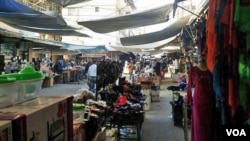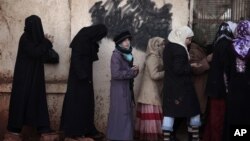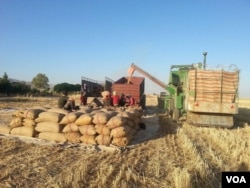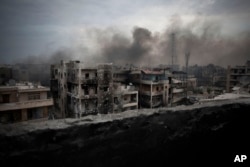At first glance, the busy market in this Kurdish city in northeastern Syria looks much like it has for decades.
Everything is available, from vegetables and fruits to cigarettes and shoes. Shoppers bargain with merchants for a cheaper price.
But in these difficult days, when war rages just miles away, getting a bargain is improbable.
“The prices are extremely high, I can’t afford it,” said an Arab woman from Aleppo, who has been living in Qamishli since she fled the fighting in her hometown in 2012.
Fighting forces levy taxes
The war in Syria has had rippling economic effects throughout the nation. Goods that used to pass freely between the agricultural Kurdish north and the highly populated cities elsewhere are now being taxed by a variety of fighting forces, including the Islamic State (IS) extremist group.
The process delays deliveries of needed daily staples, makes some items scarce, and leaves perishable goods vulnerable to decay.
Syria’s Ministry of Economy calculates the country's economy has suffered $250 billion in losses since the start of civil war in 2011.
The war against IS has barely touched this Kurdish-dominated and controlled part of Syria, but even here the conflict has been costly.
The southern frontier of the Syrian Kurdish territory is under the control of IS, while to the north, the long stretches of the border with Turkey are completely closed. There is only one makeshift border crossing with the Kurdish region of Iraq, but even there there are restrictions on the movement of goods and people.
Detours to markets
Many supplies still are reaching the local markets, albeit with detours.
“I order my goods from Aleppo. The only way to deliver them to here is through IS-held areas,” said one fabric storeowner, who refused to give his name. He said wholesalers in Aleppo pay high taxes to various armed groups, including government forces, IS militants and Kurdish groups.
“This is the only way to get stuff to Qamishli,” he said.
These makeshift taxes have led to a spike in prices, analysts say.
“Technically, the consumer pays the highest percentage of these taxes because they add up to more than the original prices of goods,” said Kurdish economist Khorshid Alika. “In the past it was only the [Syrian] regime that imposed taxes on products. Now there are more stakeholders involved.”
Grain supplies
The Kurdish region remains the main supplier of wheat and barley to regime-controlled areas such as Damascus, Latakia, Tartus and Homs. The Syrian government buys the agricultural products directly from local Kurdish farmers, but those goods must also pass through IS-controlled routes.
Locals and experts say IS provides safe passage for government trucks as long as it gets a cut. “For the government, it’s still cheaper than buying flour and other food supplies from Russia,” said economist Alika.
Islamic State benefits
IS militants are perhaps the biggest beneficiary of transactions between the Syrian regime and the Kurdish enclave. “They [IS] are very flexible and pragmatic when it comes to commercial dealings,” said Musallam Talas, a former professor of economy at Aleppo University.
Talas said that to secure its share of the economic trade, IS tries to maintain a stable relationship with a range of traders, many of who are exploiting the war for economic advantage. “These are the business mafia who control the black market,” he said.
Other analysts say the "business mafia” is well connected to all sides of the conflict, including the Kurds, the government and IS militants. But as the conditions of war shift, local economies change too.
After Aleppo, Syria’s economic capital, became an open battlefield between government forces and opposition rebels in 2012, many businessmen moved their businesses to the Kurdish city of Efrin, which remained relatively secure.
Despite an initial economic boom, continued uncertainties have prevented these businessmen from expanding their activities. Those uncertainties have grown in the past month, with Efrin coming under siege by various Islamist rebels.
“Because of its proximity to Aleppo, Efrin was becoming a hub for Arab-owned factories,” Talas said, “But the current siege makes it harder for these businesses to develop.”
That is leading factory owners to look for a new safe haven in the region.
In Qamishli, Efrin and elsewhere in the war-torn country, people have learned to adapt to a war that shows no signs of ending. But Syrians understand that life must go on.
“We all know that prices are unbearable, but people still have to buy [goods] to feed their families,” said a vendor as he stood behind stacks of cabbage in the Qamishli market.















